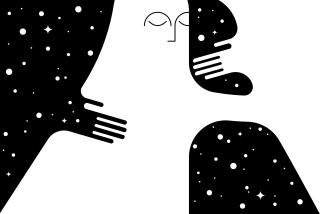Relevance to Wakeful Experiences Stressed : Dreams an ‘Inner Biography,’ Therapist Says
- Share via
SAN DIEGO — Paying attention to your dreams is a good way to get to know yourself better, according to a therapist who teaches at United States International University in San Diego.
Dreams create an “inner biography” that can be used to increase your self-awareness and even guide you in your conscious decisions, explains Dr. Patricia Ariadne, a licensed marriage, family and child therapist who teaches in the USIU School of Education.
Ariadne developed an interest in dreams after reading books by psychiatrist Carl Jung and keeping her own dream diaries. Today, she utilizes dream awareness in her therapy practice.
Paying Attention to Dreams
“Not everybody can afford a psychotherapist,” she said, “but everybody can afford to pay attention to his or her own dreams.”
She is doing research on a book about women involved in feminist arts and ideas who actively create on the basis of their dream imagery. In addition, she has taught workshops to college and community groups about getting in touch with dreams. She meets weekly with a group of women who share their dreams in an attempt to better understand and use the information.
Ariadne also helps individuals learn about themselves--their fears, wishes and conflicts--by working on dreams in one-to-one therapy sessions.
“Paying serious attention to your dreams can help you assimilate unknown parts of yourself and grow as a person,” she said. “While your dreams can’t solve your problems, dreams can give you additional information and help you analyze your choices.”
Society tends to discount the relevance of dreams, said Ariadne, who laments the fact that most parents teach their children not to pay attention to them. A former elementary schoolteacher, she pointed out that children can remember dreams quite easily.
“They are naturally more receptive to their unconscious,” she said, “and remember dreams until parents imply that dreams are unimportant by commenting, ‘It’s only a dream,’ when children want to share their dreams.
“We should see dreams as healthy, natural components of our personalities, not as something outside of us. Our dreams are us.”
Getting in touch with your dreams starts with such simple activities as keeping a journal in which you write down dreams, Ariadne said. Reading a book that suggests the meaning of symbols in dreams is also a good idea, she said, as long as you realize that each person has his or her own symbolism and needs to create a personal “dream dictionary” to help interpret the dreams.
Other activities she suggested to put your dreams to work in your conscious life include:
- Draw a picture of your dream. Drawing can help you understand the dream better and can make it come alive in the daylight.
- If you are bothered by a dream, create an ending for it that will work out the dream to a satisfactory outcome and write it down.
- Try influencing what you dream about. Ask yourself a question or visualize someone you want to dream about in the quiet time just before you go to sleep.
- Discuss your dreams with someone you trust. Often another person can give you a different point of view about your dream. However, it is important to remember that each person has a right to interpret his or her own dreams and that no one should force an interpretation onto someone else.
Most people dream four or five times each night, Ariadne said, and most remember the last dream, which is usually the longest.
“Mostly it seems to be a matter of interest,” she said. “If you try to remember your dreams and pay attention to them, then it becomes easier and easier to remember.
Ariadne suggested writing down dream memories and your feelings and ideas about them in a journal even if the meaning of a dream is not clear right away. Often a subsequent dream or something that later happens in your conscious life will help explain a dream, she said.
If you have the same dream over and over, she said, it may be an attempt by your unconscious to get you to pay attention to a problem in your life. In a similar manner nightmares can be an attempt to direct one’s attention, although nightmares can also have physiological causes, she said.
The USIU professor says everyone has little dreams and big dreams.
“Little dreams are the routine ones that your unconscious uses to sort your thoughts,” she said, “while big dreams are those which seem to ask you a question or signify the need for a change in a life direction.
“Some big dreams are so significant they will wake you up. It’s almost as if your unconscious taps you on the shoulder and says, ‘Wake up! This is important.’ ”


